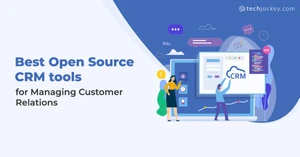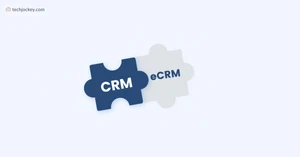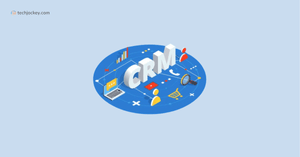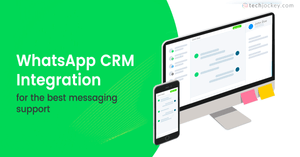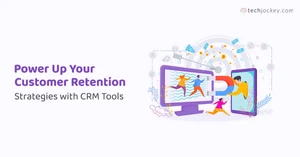Do you know how many deals your salesperson closed or lost last quarter?
If it takes more than 5 minutes to analyse this question, then CRM is the solution to your business problem.
Using spreadsheets to maintain customer data is an affordable solution but to grow your business and sync other departments, you should switch to the best CRM software. CRM software can help sales reps, sales managers, marketing reps, marketing managers, customer service agents, and product managers, all in one place.
You can quickly capture leads, segment leads, create drips, automate campaigns, sign documents in minutes and identify bottlenecks in the workflow.
Businesses can leverage CRM platforms to break department silos, automate manual work, improve team productivity and get detailed analytics.
Investing in CRM can provide positive ROI to businesses.
To understand how CRM works, which software to choose, and its key features, let's dive into this buyer's guide.
7 Clear Indicators You Need a CRM Solution Now
When sales are slipping, growth is stagnant, and clients are leaving, it's time to use CRM to keep the ball rolling and find new customers. Below are some common signs that suggest your team needs a CRM.
- Scattered data and no single view: Each team works on customer data separately to enter and maintain data in different Excel sheets. The extra time and effort spent on data processing increases costs and consumes extra time. Therefore, switching to CRM software that can automatically sync information between various platforms is the only way you can handle this situation. CRM tool that allows you to collate all the information in one place.
- Poor pipeline and sales forecast: In quarterly sales meetings, one question is often asked about pipeline estimates and sales forecasts from sales executives. Poor data maintenance and lack of metrics can lead to incorrect sales predictions. This problem can be solved with a top CRM system that provides a centralised view, tracks lead through each stage of the sales funnel, and analyses key metrics for data-driven adjustments.
- No record of best quality leads’ source: If you generate 10 leads that are converted directly into your customers. Now, how do you know where that best quality lead comes from? It was either through a campaign, trade show or a website. If you're unable to track your lead source, then you must opt for CRM. It can track and identify profitable marketing channels for you to tap that again.
- Account and territory clashes: During weekly syncs, is your team spending half the time over leads and determining which account belongs to whom? If so, it may be time to opt for a CRM system. CRM software can help streamline your processes by clearly assigning leads and accounts to the right team members. It reduces confusion and ensures everyone knows their responsibilities rather than wasting time on internal disputes.
- Forgotten leads to nurture: Let us suppose you have 6 new leads and need to reply to them and follow up on the older leads. Without a CRM, you must go through multiple Excel sheets and get in touch with the marketing team to check each lead's details. This process makes it difficult to monitor everything, which raises the possibility of overlooking some leads. CRM can quickly check open leads, set up automated follow-ups, and get reminders.
- Zero prioritisation of opportunities: Your team can improve lead qualification with the CRM system's lead scoring rules. Based on actions, demographics, and likelihood to convert, CRM tools can help you prioritise promising leads first. You can set reminders for follow-ups and closing high-priority deals without any delay. Focusing on sales efforts where required more can increase engagement levels and sales efficiency.
- Inability to track sales activities: Can you calculate how many sales calls you made or follow-up emails you sent to the top 5 leads in the last week? If the question is slightly tough to answer, then CRM can solve all your troubles. Best CRM software allows sales reps to record every phone call, email, and interaction to track progress through each stage in the sales funnel.
CRM software stores and manages all information in one place and helps your sales team close deals much faster.
Benefits of using CRM
Right CRM software can put the right resource in the right place at the right time. It allows you to assign tasks based on rules you set in the workflow. You can leverage CRM tools to help your team get all the information in minutes rather than scrolling all day.
Businesses that spend $1 on sales CRM software can anticipate an average return on investment (ROI) of $8.71. This data provides valuable insights for businesses still thinking about switching to CRM systems.
Identify the problems you’re trying to solve
Whether a healthcare professional or a real estate broker, you must record daily activities and track routine processes to grow your business. Similarly, different businesses in multiple industries need solutions for their daily problems. CRM tools can resolve these concerns.
For real-time benefits, specific CRM solutions are available that solve unique problems of different businesses. Types of CRM platforms are:
- On-premises CRM
- Cloud-based CRM
- Industry-specific CRM
- All-in-one CRM
Below mentioned are some suggestions for the best CRM software.
| CRM Software Overview |
| Industry | Problem Statement | Solution | CRM Software | Prices | Product Reviews |
| Retail and e-Commerce | Struggling to manage customer data, track sales, and personalize campaigns. | Centralize customer data, enhance personalized marketing, and track interactions. | Freshsales CRM | ₹1,199 /month (excluding GST) | Freshsales Reviews |
| Healthcare | Difficulty in managing patient information, scheduling, and follow-ups. | Streamline patient management, appointment scheduling, and follow-ups and care coordination. | Salesforce Health Cloud | $25 /month | Salesforce Reviews |
| Real Estate | Managing client's proposals, agreements and property listings manually. | Help organize leads, track property listings, and manage communications for more sales. | Sell.do | ₹1,799 /month (excluding GST) | Sell.do Reviews |
| Financial Services | Struggling to track client accounts and manage financial portfolios. | Help track financial transactions, provide tailored services, and improve customer engagement and retention. | Zoho CRM | ₹1,300 /month | Zoho CRM Reviews |
| Hotels | Need to improve guest experience and manage bookings. | Centralize guest data, track booking patterns, and offer tailored services to guests. | HubSpot CRM | $15 /month | HubSpot Reviews |
| Insurance | Challenges in managing client policies, claims, and renewals. | Streamline client data, help with policy management, track claims, and improve communication to ensure timely renewals. | TeleCRM | ₹2,547 /month (excluding GST) | TeleCRM Reviews |
| Consulting Industry | Difficulty in managing client projects, timelines, and ongoing communication. | Streamline project management and improve the ability to follow up and cross-sell services to existing clients. | Pipedrive CRM | $12 /month | Pipedrive CRM Reviews |
Key Features of CRM
Different teams use CRM for different functions. The basic features of CRM can vary according to the requirements of teams. However, key features of CRM that a user must see while purchasing software are:
- 360-degree Customer View: CRM systems manage contact and account information. Provides easy data management and data import/export functionalities.
- Task and Activity Management: CRM software allows users to assign, track, and manage sales activities. From pipeline and deal management to lead assignment, you can set multiple rules in CRM and track tasks and team activities.
- Marketing Automation: CRM tools make it simple to automate campaigns, customise workflows, and create personalised campaigns based on customer behaviour. CRM software lets you perform marketing functions and send bulk emails without hassle.
- Tracking & Integration: It provides a centralised platform where you can store, manage, and track customer and team data across various channels. Some CRM systems provide advanced integration with platforms for better data flow.
- Predictive Analysis: CRMs have in-built analytical tools for sales forecasting, and analysing future trends based on customer engagement. It allows teams to gain valuable insights from data-driven reports of overall business.
- Easy Collaboration & Customization: Businesses can leverage CRM systems for team communication and collaboration. Team members can share documents, add comments, and message internally in spaces and threads. Role-based access, workflow & dashboard customization, and custom fields are some other functions that team managers can perform in CRM.
- Support: CRM software provides omnichannel support, a ticketing system, case management, a knowledge base, and mobile app support. It consists of pre-built templates for invoices, quotes, emails, letters, proposals, contracts, and sales presentations.
- AI Capabilities: AI-powered CRM software can automate tasks, provide sales recommendations, solve queries quickly with chatbots and improve forecasting. AI in CRM can also create follow-up emails by reviewing customer tone.
CRM requirements checklist for teams
You can use this checklist for choosing a CRM software. Leverage these requirements if you are in Sales, Marketing or Customer Service/Support teams for gathering information about potential CRM tools.
| CRM Features Overview |
| Sales | Marketing | Customer Service | Lead Segmentation | Audience Segmentation | Customer Profiles |
| Lead Generation | Auto-assignment | Interaction History | Contact History | Multi-Channel Lead Generation | Case Management |
| Lead Tracking and Scoring | Contact Management | Customer Email History | Opportunity Management | Drip Campaigns | Ticket Routing |
| Deal Stages | Automated Campaigns | SLA Management | Quotes and Invoices | Email Templates | Internal Tickets |
| Payment Tracking | A/B Testing | Escalation Rules | Email Tracking & Sync | Content Scheduling | Response Templates |
| Sales Funnel Forecasting | Email Tracking | Email Alerts | Revenue Forecasting | Engagement Tracking | Customer Surveys |
| Team Collaboration | Campaign Performance | Knowledge Base | Notes Sharing | Content Sharing | Helpdesk Integration |
| Calendar Management | Social Media Integration | Live Chat | Field Sales Management | Ad Platforms and Landing Pages | Customer Privacy Regulations |
| Custom Views | Lead Nurturing | Quote Templates | Workflow Customisation | Multi-Channel Outreach | Task Automation |
CRM Software Suggestions
Implementing CRM Systems
Although every CRM software has the same functions, it can take some time to find the one that best suits your particular requirements. We have compiled a list to make your process easier and enable you to make decisions more rapidly.
Step 1. Define your objectives
Before purchasing a CRM, define your business goals. Consider what challenges you want to address, such as improving customer service, boosting sales, or automating marketing tasks.
Step 2. Research the best CRM providers
Once your goals are defined, evaluate different CRM vendors based on features, pricing, scalability, and compatibility with your existing systems. Involve key team members from sales, marketing, and IT.
Step 3. Plan for data migration
Prepare for a smooth data migration by reviewing and organizing your existing data (e.g., customer details, sales history). Plan the process with the CRM vendor and stakeholders for transferring this data into the new CRM system.
Step 4. Customize the CRM to fit your needs
Customize the CRM system to match your business processes and workflows. This includes setting up custom fields, creating specific reports, configuring dashboards and setting user roles and permissions.
Step 5. Integrate with other systems
Ensure the CRM integrates seamlessly with other tools your business uses, such as email marketing platforms, ERP systems, or customer support software. It will reduce manual work.
Step 6. Configure user access and permissions
Set up user roles and permissions to control who can access and edit different types of data in the CRM. This ensures that each user has access only to the information they need, protecting sensitive customer data.
Step 7. Provide training to users
Offer comprehensive training to all users to ensure they are comfortable using the CRM. Include basic navigation, key features, and workflows. Provide help documents and resources for ongoing support.
Step 8. Test the system
Before going live, test the CRM system thoroughly. Check the accuracy of data migration, ensure integrations are working properly, and verify that essential features, like reporting and automation, are functioning as expected.
Step 9. Go Live
Launch the CRM system across your organization after successful testing. Monitor the system closely during the initial rollout and provide support to users. Address any issues that arise quickly to minimize disruption.
Step 10. Monitor and optimize
After the CRM is live, continuously monitor its performance. Collect feedback from users to identify pain points and areas for improvement. Regularly optimize the system to ensure it continues to meet your business goals.
Step 11. Ongoing support and maintenance
Ensure there is ongoing support and maintenance for the CRM. This includes troubleshooting issues, providing software updates, and periodically reviewing system performance.
11 questions to ask your CRM vendors
- Do you have other companies of my industry that are using your CRM?
- How user-friendly is your CRM for my team?
- Can your CRM solution be customized to meet the specific needs and workflows of my business?
- What is the process for importing and exporting data in your CRM?
- What steps do you follow to migrate data from our existing CRM system?
- Does your CRM integrate with other software platforms we currently use?
- What kind of automation features does your CRM provide?
- What analytics, insights, and reporting features does your CRM provide?
- How can I manage user access and permissions within your CRM?
- What training documents and onboarding support do you provide?
- How fast is your CRM during high-traffic periods and does it offer offline mode?
Why do Businesses Use CRM Tools?
Paid or free CRM software are essential tools for managing customer relations in less time. Popular CRM systems help automate all customer interaction processes and provide business intelligence for improving lead conversion. Businesses majorly use CRM software for:
- Storing customers' data in a centralized repository.
- Distributing information across departments.
- Checking purchase histories.
- Marketing automation for better sales.
- Optimizing workloads to save time.
- Inbuilt analytics tools for handling data insights.
- Building accurate marketing strategies.
- Managing the leads effectively.
Discover CRM Market





























































